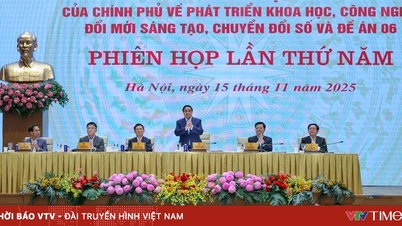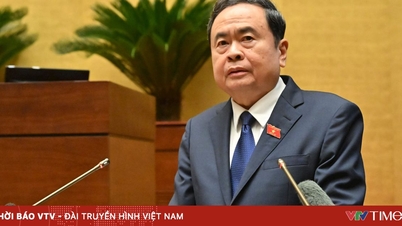According to The New York Times (NYT), while millions of Americans are struggling with rising prices and record federal budget deficits, the Treasury Department and Internal Revenue Service (IRS) under President Donald Trump quietly issued a series of new regulations, reducing hundreds of billions of dollars in tax incentives for large corporations and the super-rich.
These “technical incentives” were announced through a series of internal memos and draft regulations since last summer, without congressional approval, without a press conference, and without public scrutiny. But according to tax experts, those quiet announcements have largely invalidated the Inflation Reduction Act (IRA) of 2022, which President Joe Biden signed into law to ensure that highly profitable companies pay a minimum of 15% corporate income tax.
The law, which was expected to raise $222 billion over 10 years, may now be reduced to a mere figure after the Trump administration loosened, exempted and “rewrote” its implementing regulations.
* Tax cuts that do not pass Congress
According to the NYT, the new regulations of the Ministry of Finance have opened up tax escapes for a series of wealthy industries: Private equity funds, cryptocurrency companies, insurance groups, foreign real estate investments and transnational corporations.
“The Treasury is implementing tax cuts that Congress never passed,” said Kyle Pomerleau, a tax expert at the American Enterprise Institute (AEI). “Congress makes tax laws, not the Treasury. When an executive branch expands its authority like that, it violates constitutional principles.”
President Trump signed the Big, Beautiful Act (OBBBA) in July, a $4 trillion tax cut plan, largely for big businesses and the wealthy, in exchange for cuts to health care for the elderly and the Supplemental Nutrition Assistance Program (SNAP) for the poor.
Now, under new Treasury regulations, companies will receive hundreds of billions of dollars in additional relief, while the federal budget deficit swells by trillions of dollars.
* The way out for the super rich
According to the disclosure, two major cryptocurrency companies, Coinbase and Strategy, were at risk of being subject to a minimum tax of billions of dollars under the IRA law. But after lobbying by a group of lawyers who served in the Trump administration, the IRS officially “relaxed the regulations”, exempting the above companies on the grounds of “unrealized profits”. As a result, just a few hours later, Strategy announced that it was “no longer subject to the minimum tax”.
Some energy companies have also been quick to benefit. Cheniere Energy, the largest natural gas exporter in the United States, revealed that thanks to the latest announcement from the Treasury Department, it will receive a $380 million tax refund.
Investment funds like Blackstone, the Wall Street icon, also won “flexibility privileges” to recalculate their tax liability in the most favorable way. Insurance companies were allowed to offset losses from previous years to reduce their current tax liability.
“What they’re doing is essentially wiping out the entire law,” said veteran tax lawyer Monte Jackel, a former IRS official. “This is no longer technical guidance, this is a rewrite of the tax code.”
* President Trump opens "tax havens" for the elite
Financial analysts call this version 2.0 of the “tax cut for the rich” policy that started in President Trump’s first term. At that time, similar regulations eliminated inheritance taxes on large assets and sharply reduced corporate tax to 21%, leaving a series of large corporations such as Amazon, Microsoft, AT&T to pay almost no tax.
Meanwhile, American workers continue to pay taxes regularly and welfare programs like Medicare and Medicaid continue to be cut to “make up for the deficit.”
“When the Treasury Department issues regulations instead of going through Congress, they can give preferential treatment to a small group without having to cut elsewhere to compensate. It’s a way to give gifts to the rich without anyone seeing it,” said Daniel Hemel, a law professor at New York University.
According to experts, the Trump administration calls this an “investment incentive policy,” but in reality, it is a sophisticated copy of the old “trickle-down” policy, meaning money flows up, never trickling down.
While billionaires rejoice over lighter tax bills and the national budget deficit increases by trillions of dollars, ordinary people will suffer the consequences through health care services, social security, and higher prices of goods.
The question is no longer “who gets tax cuts?” but “who will pay the taxes that the wealthy have just been exempted from?”
Source: https://vtv.vn/tong-thong-trump-am-tham-giam-hang-tram-ty-usd-tien-thue-cho-gioi-sieu-giau-100251114143214078.htm




![[Photo] Action for the Community tells stories of enduring journeys – both intimate and great, yet quiet and determined](https://vphoto.vietnam.vn/thumb/1200x675/vietnam/resource/IMAGE/2025/11/15/1763179022035_ai-dai-dieu-5828-jpg.webp)









































































































Comment (0)